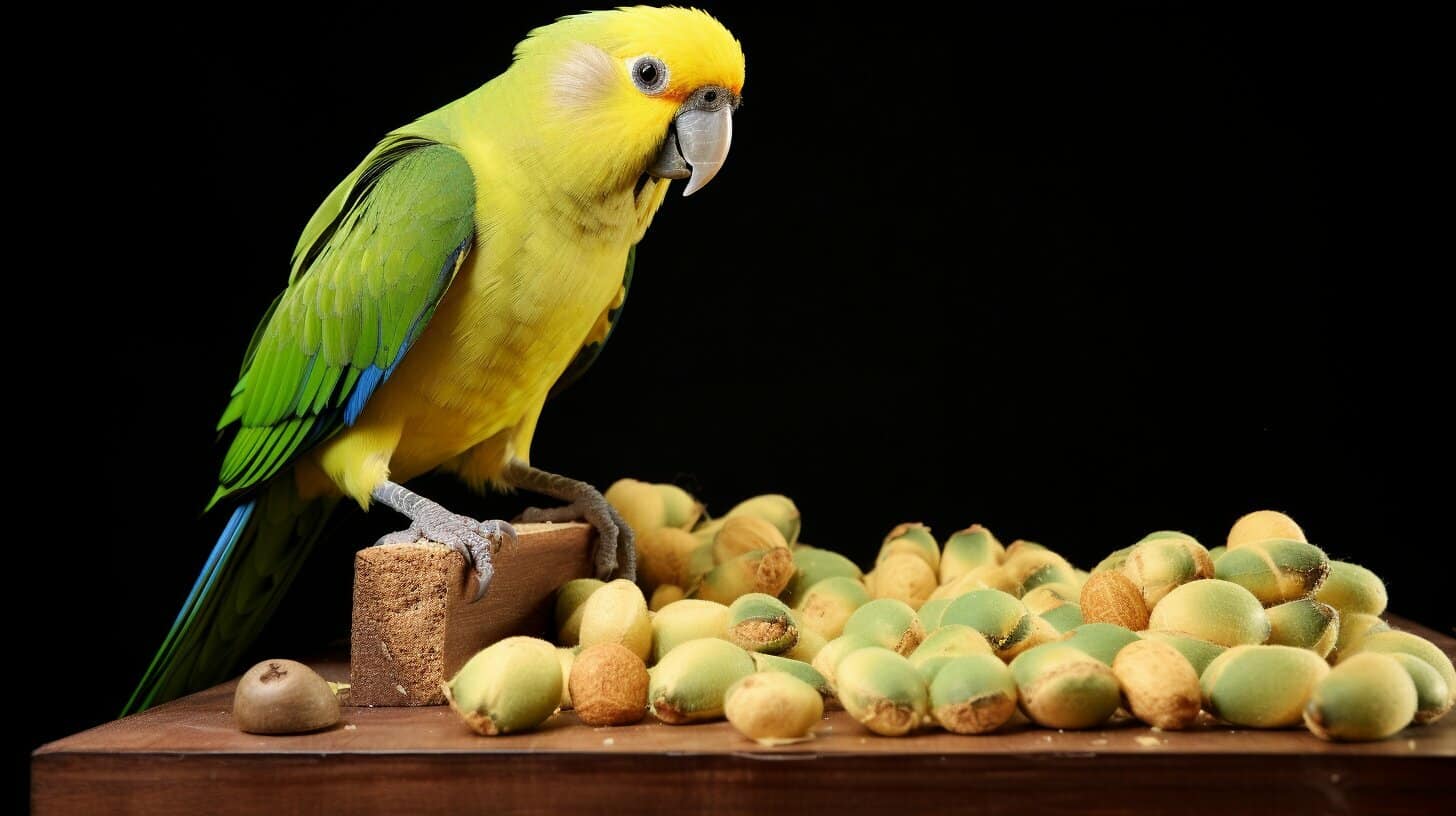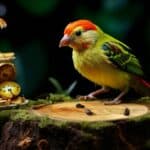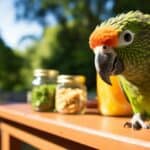If you’re a proud kakariki owner, you’re probably curious about what foods are safe and healthy for your feathered friend to consume. With so many options out there, it can be challenging to determine what is best for their wellbeing. One food that may come to mind is monkey nuts, also known as peanuts. But can kakarikis eat monkey nuts safely? Let’s explore this topic further.
Can kakarikis eat monkey nuts? Kakarikis can eat monkey nuts in moderation. However, when offering monkey nuts to kakarikis, it’s crucial to ensure they are fresh, unsalted, and free from mould. Overconsumption might lead to health issues, so they should be provided as an occasional treat and not a staple in their diet. It’s always best to consult an avian veterinarian for specific dietary recommendations.
Key Takeaways:
- Kakarikis can eat monkey nuts in moderation as long as precautions are taken.
- Monkey nuts offer several nutritional benefits for kakarikis, including protein and healthy fats.
- It’s crucial to maintain a balanced and varied diet for your kakariki, incorporating a mix of fruits, vegetables, seeds, grains, and occasional nut treats.
Understanding Kakariki’s Diet
If you’re considering adding monkey nuts to your kakariki’s diet, it’s essential to understand their dietary preferences. Kakarikis have a diverse diet that includes fruits, vegetables, seeds, and grains. They require a high-fibre and low-fat diet to maintain their optimal health.
A varied diet can help ensure your kakariki gets all the essential nutrients it needs. Fresh fruits and vegetables provide vitamins and minerals that contribute to their overall well-being. Seeds and grains are excellent sources of protein and fibre, making them a staple in a kakariki’s diet.
It’s important to note that not all fruits and vegetables are safe for kakarikis. Some foods, such as avocado and chocolate, can be toxic to them. Researching and offering your feathered friend appropriate food choices is crucial.
Meeting Your Kakariki’s Nutritional Needs
A balanced diet that meets a kakariki’s nutritional needs is crucial for health and happiness. A well-rounded diet should include:
- A variety of fresh fruits and vegetables
- High-quality seeds and grains
- Occasional nuts treats as a source of healthy fats and essential nutrients
The right balance of nutrients can promote feather development, muscular strength, and overall health.
Now that we’ve explored a kakariki’s dietary preferences let’s take a closer look at monkey nuts and their compatibility with their diet.
Exploring Monkey Nuts
Monkey nuts, also known as peanuts, are a popular human snack. But can your kakariki safely consume them?
Monkey nuts offer a range of essential nutrients that can benefit your feathery friend’s health. They are a good source of protein, healthy fats, vitamins, and minerals. However, their compatibility with a kakariki’s diet needs further exploration.
| Pros | Cons |
|---|---|
| High in protein, promoting feather development and muscular strength | May pose a choking hazard due to their size |
| Rich in healthy fats, contributing to overall wellbeing | Not a natural part of a kakariki’s diet |
| Contain essential nutrients such as vitamins and minerals | May cause digestive issues in some birds |
Tip: If you decide to introduce monkey nuts to your kakariki’s diet, it’s crucial to take certain precautions. Always remove the shell to prevent choking hazards. Offer small, bite-sized pieces and monitor your bird’s response. If any adverse reactions occur, discontinue feeding monkey nuts.
While monkey nuts are not toxic to your kakariki, they may not be the best choice for their diet. Other nuts are safer for your feathered friend to consume. In the following sections, we will explore what nuts are safe for kakarikis and how to maintain a balanced diet for optimal health and happiness.
Safe Nuts for Kakarikis
While monkey nuts may seem like a fun treat for your feathered friend, it’s important to consider the safety of nuts for kakarikis. Due to their small size, monkey nuts can pose a choking hazard, especially if your kakariki tries to swallow them whole.
But don’t worry, plenty of safe nut options for your kakariki to enjoy. Some of the best nuts for kakarikis include:
| Nut | Description |
|---|---|
| Almonds | Walnuts are another excellent source of protein, healthy fats, and vitamins. Like almonds, they should be unsalted and unsweetened before feeding your kakariki. |
| Walnuts | Cashews are a good source of healthy fats and essential minerals, such as zinc and magnesium. Make sure to remove the shell before feeding your kakariki. |
| Cashews | Cashews are a good source of healthy fats and essential minerals, such as zinc and magnesium. Make sure to remove the shell before feeding to your kakariki. |
Remember, even with safe nut options, moderation is key. Nuts should only be offered as occasional treats, and they should never be the primary source of nutrition for your kakariki.
If you do decide to feed monkey nuts to your kakariki, always remove the shell and offer small, bite-sized pieces. Monitor your bird’s response and discontinue feeding if any adverse reactions occur.
By choosing safe nut options and maintaining a balanced diet, you can ensure the health and happiness of your feathery friend.
Nutritional Value of Monkey Nuts for Kakarikis
Monkey nuts, also known as peanuts, can be a nutritious addition to your kakariki’s diet. They are a good source of protein, healthy fats, vitamin E, and other essential minerals.
| Nutrient | Amount per 100g of monkey nuts |
|---|---|
| Protein | 25.8g |
| Fat | 49.2g |
| Carbohydrates | 16.1g |
| Vitamin E | 8.3mg |
| Magnesium | 168mg |
| Phosphorus | 376mg |
Note: While monkey nuts are a good source of nutrients, they should not be the primary source of your kakariki’s diet. It’s important to offer a varied and balanced diet.
Health Benefits of Monkey Nuts for Kakarikis
Monkey nuts are a nutritious addition to your kakariki’s diet. They contain a high amount of protein, which is essential for feather development and muscular strength. Additionally, the healthy fats in monkey nuts contribute to their overall well-being, helping to keep their feathers healthy and shiny.
But remember, moderation is key when feeding your kakariki monkey nuts. Offering too many can unbalance their diet and potentially lead to weight gain. It’s best to offer them as an occasional treat alongside a variety of fruits, vegetables, seeds, and grains to ensure optimal health.
When introducing monkey nuts to your kakariki’s diet, monitor their response to them. Some birds may have allergies to nuts, which can cause adverse reactions. If you notice any unusual behaviour or symptoms, discontinue feeding monkey nuts and consult with your veterinarian.
Overall, monkey nuts can provide important nutrients and health benefits to your kakariki when fed in moderation. Remember, a balanced and varied diet is essential to keep your feathered friend happy and healthy.
Kakariki Diet and Nut Consumption
When it comes to feeding your kakariki, it’s important to consider their diet and nut consumption. While monkey nuts can be included in their diet occasionally, they should not be the primary source of nutrition.
Offer a varied diet that includes fruits, vegetables, seeds, grains, and occasional nut treats. A balanced diet will help maintain your feathery friend’s overall health and happiness.
Consulting with a veterinarian can also help determine the best diet for your kakariki and ensure they are receiving the proper nutrition they need.
Feeding Monkey Nuts to Kakarikis
If you’re considering feeding monkey nuts to your kakariki, there are a few precautions you should take. First and foremost, always remove the shell before offering the nut to your bird. The shell can pose a choking hazard, so it’s important to discard it before consumption.
Next, offer small, bite-sized pieces of monkey nuts to your kakariki. This will help prevent any potential choking hazards and make it easier for them to digest. Monitor their response to the nuts and observe for any adverse reactions.
If your kakariki shows any adverse reactions after consuming nuts, discontinue feeding them and seek veterinary advice if necessary. It’s important to note that some birds, including kakarikis, may have nut allergies, so it’s crucial to observe any symptoms that may arise.
Remember, while monkey nuts can be included in your kakariki’s diet in moderation, they should not be the primary source of nutrition. It’s essential to offer a varied diet that includes fruits, vegetables, seeds, grains, and occasional nut treats. Consulting with a veterinarian can help determine the best diet for your kakariki’s overall health and happiness.
Kakarikis and Nut Allergies
It’s important to be aware that some birds, like kakarikis, can have allergies to nuts. If you suspect your feathered friend has an allergy, always observe their behaviour after feeding them nuts and look out for any adverse reactions such as itching, swelling, or difficulty breathing. If your kakariki displays any of these symptoms, seek advice from your veterinarian immediately.
Maintaining a Balanced Diet for Kakarikis
If you want to ensure your kakariki’s overall health and happiness, it’s crucial to maintain a balanced and varied nutritional intake. Here are some tips to help you achieve that:
- Offer a variety of fruits and vegetables, such as apples, carrots, spinach, and broccoli.
- Include a mix of grains and seeds, such as millet, quinoa, and sunflower seeds.
- Provide occasional nut treats, such as almonds, cashews, and hazelnuts, in small amounts.
- Ensure fresh, clean water is available at all times.
- Limit sugary and fatty foods, as they can lead to obesity and other health problems.
Remember to consult with a veterinarian for advice on the best diet for your specific kakariki. By maintaining a balanced and varied diet, you can help ensure a long and healthy life for your feathered friend.
Conclusion
So, can Kakarikis eat monkey nuts? The answer is yes, but it’s essential to take certain precautions. Always remove the shell to prevent any choking hazards and offer small, bite-sized pieces. Remember that while monkey nuts offer nutritional benefits, they should not be the sole focus of your kakariki’s diet. A varied diet that includes fruits, vegetables, seeds, grains, and occasional nut treats is vital to ensure their overall health and happiness.
It’s also important to consider your kakariki’s safety when feeding nuts and to monitor their response. If any adverse reactions occur, discontinue feeding monkey nuts and consult with a veterinarian if necessary. Additionally, keep in mind that some birds, including kakarikis, may have nut allergies. If you suspect your bird may have an allergy, observe any adverse reactions after feeding nuts and seek veterinary advice if necessary.
Ultimately, maintaining a balanced and varied nutritional intake is key to keeping your feathery friend happy and healthy. By following the appropriate precautions and incorporating a mix of foods into their diet, your kakariki can enjoy the occasional monkey nut treat without any issues.
FAQ
Q: Can Kakarikis Eat Monkey Nuts?
A: Yes, kakarikis can eat monkey nuts in moderation.
Q: What is the diet preference of kakarikis?
A: Kakarikis mainly consume a variety of fruits, vegetables, seeds, and grains.
Q: What are monkey nuts?
A: Monkey nuts, also known as peanuts, are a popular snack for humans.
Q: Are monkey nuts compatible with a kakariki’s diet?
A: Monkey nuts are rich in protein, healthy fats, and essential nutrients, but their compatibility with a kakariki’s diet needs further exploration.
Q: Are there safer nuts for kakarikis to consume?
A: While monkey nuts are not toxic to kakarikis, they may pose a choking hazard due to their size. There are other nuts that are safer for kakarikis to consume.
Q: What is the nutritional value of monkey nuts for kakarikis?
A: Monkey nuts offer a range of essential nutrients, including protein, healthy fats, vitamins, and minerals.
Q: What are the health benefits of monkey nuts for kakarikis?
A: Monkey nuts can promote feather development, muscular strength, and overall well-being in kakarikis.
Q: How should monkey nuts be included in a kakariki’s diet?
A: Monkey nuts should be included occasionally and not as the primary source of nutrition. A varied diet that includes fruits, vegetables, seeds, grains, and occasional nut treats is recommended.
Q: How should monkey nuts be fed to kakarikis?
A: When feeding monkey nuts to kakarikis, always remove the shell to prevent choking hazards. Offer small, bite-sized pieces and monitor your bird’s response. Discontinue feeding if any adverse reactions occur.
Q: Can Kakarikis have nut allergies?
A: Some birds, including kakarikis, may have nut allergies. Observe any adverse reactions after feeding nuts and seek veterinary advice if necessary.
Q: How can a balanced diet be maintained for kakarikis?
A: To maintain a balanced diet for kakarikis, incorporate a mix of fruits, vegetables, seeds, grains, and occasional nut treats.



Have comments or questions about this article? Then get involved!
Spotted an error or something we have missed? Let us know